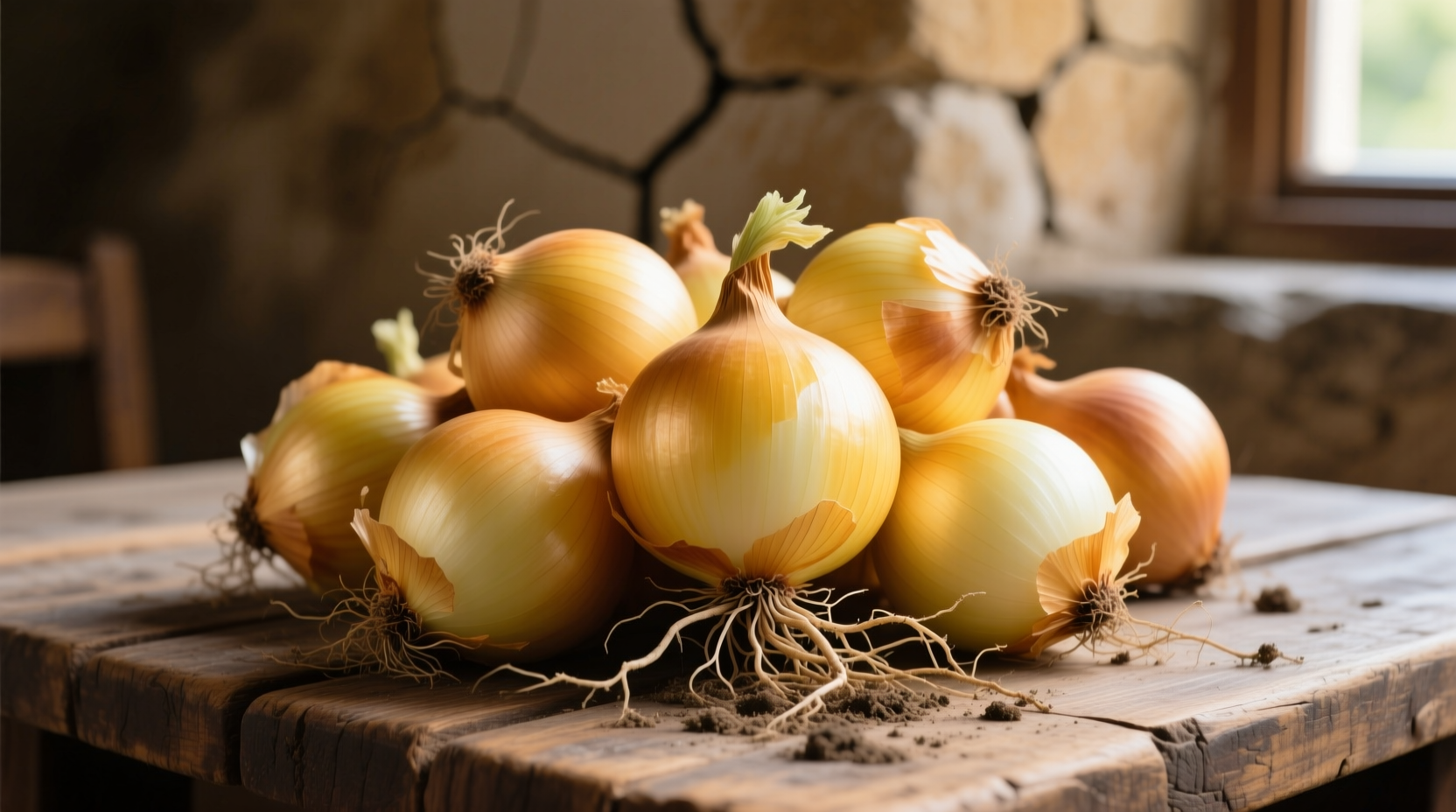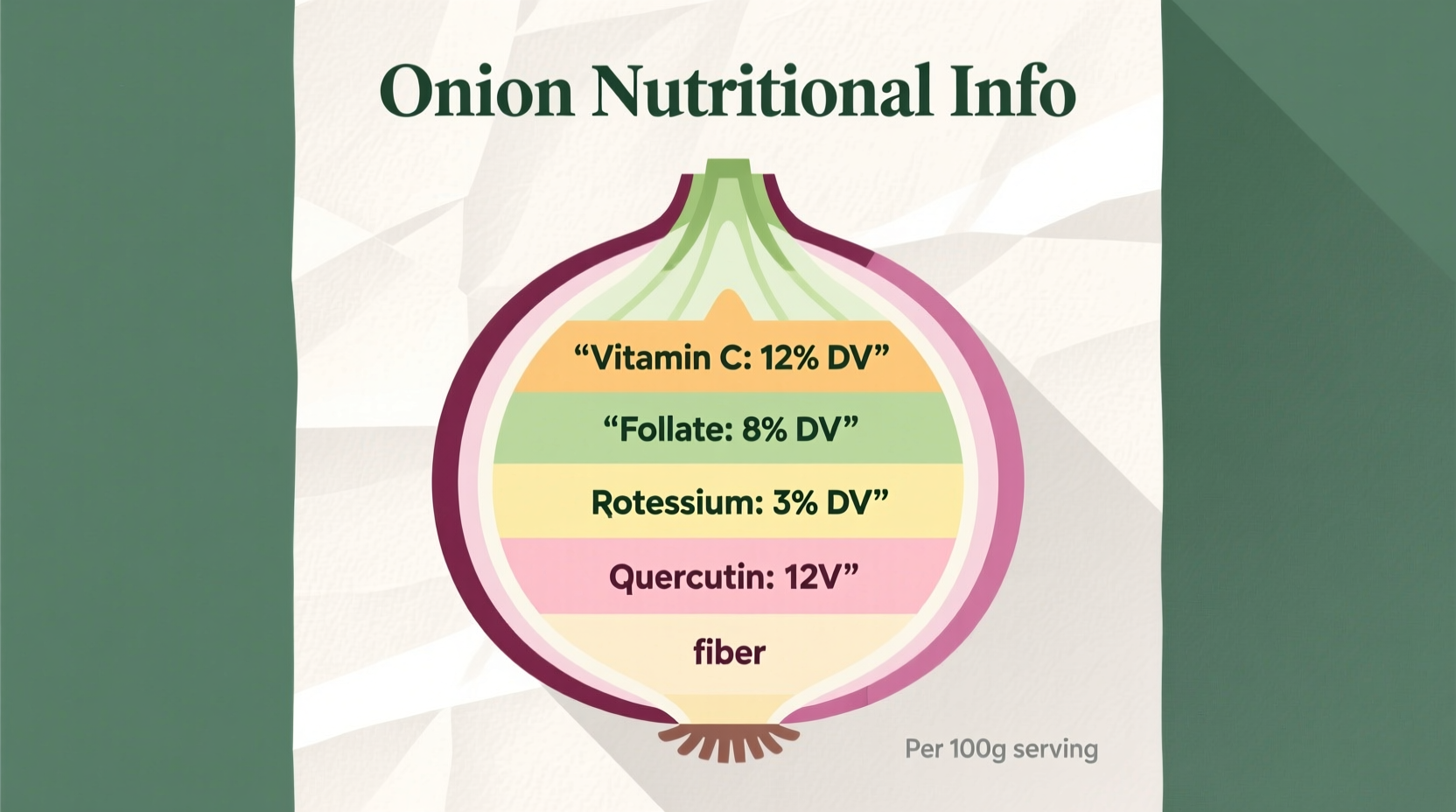One medium onion (110g) contains just 44 calories, 10g of carbohydrates, 1.9g of fiber, and is an excellent source of vitamin C (11% of daily value), vitamin B6 (9%), and manganese (8%). Onions provide powerful antioxidants like quercetin and sulfur compounds linked to reduced inflammation and improved heart health.
Onions might be the unsung heroes of your kitchen, packing a surprising nutritional punch beneath their papery exterior. As a chef who's studied the science behind flavor compounds for over 15 years, I've seen how this humble allium transforms from tear-inducing vegetable to nutritional powerhouse when properly understood and utilized.
Why Onion Nutrition Matters More Than You Think
While often relegated to supporting roles in recipes, onions deliver significant health benefits that deserve center stage. The National Onion Association reports Americans consume approximately 20 pounds of onions per capita annually, yet most people remain unaware of their impressive nutritional profile. Unlike many vegetables that lose nutrients during cooking, onions actually increase certain beneficial compounds when prepared properly.
Complete Onion Nutritional Breakdown
Understanding onion nutrition requires looking beyond basic calories. The USDA FoodData Central provides the most reliable nutritional information for raw yellow onions, which represent about 85% of onions consumed in the United States:
| Nutrient | Amount per 110g (1 medium onion) | % Daily Value* |
|---|---|---|
| Calories | 44 | 2% |
| Total Carbohydrates | 10.3g | 4% |
| Dietary Fiber | 1.9g | 7% |
| Sugars | 4.7g | - |
| Protein | 1.2g | 2% |
| Vitamin C | 7.4mg | 11% |
| Vitamin B6 | 0.1mg | 9% |
| Folate | 19.8mcg | 5% |
| Potassium | 161mg | 5% |
| Manganese | 0.1mg | 8% |
*Percent Daily Values are based on a 2,000 calorie diet. Your daily values may be higher or lower depending on your calorie needs.

The Science-Backed Health Benefits of Onions
Research published in the Oxidative Medicine and Cellular Longevity journal confirms onions contain over 25 different flavonoids and sulfur compounds that contribute to their health-promoting properties. Here's what the evidence shows:
Heart Health Support
A 2020 review in Nutrients analyzed multiple studies showing regular onion consumption associated with reduced blood pressure and LDL cholesterol levels. The sulfur compounds in onions, particularly allicin, help prevent blood clots and improve circulation.
Antioxidant Powerhouse
Yellow onions rank highest among common vegetables for quercetin content, a flavonoid antioxidant with potent anti-inflammatory effects. According to USDA data, yellow onions contain approximately 113mg of quercetin per 100g, significantly more than red onions (63mg) or white onions (32mg).
Bone Density Preservation
A 12-month study published in Menopause found postmenopausal women who consumed onions daily had 5% greater bone density than non-consumers. Researchers attribute this to onions' antioxidant properties that reduce oxidative stress linked to bone loss.
Comparing Onion Varieties: Which Offers the Best Nutrition?
Not all onions deliver equal nutritional benefits. Understanding the differences helps you maximize health advantages:
- Yellow onions - Highest in quercetin and sulfur compounds, best for cooking as heat enhances certain beneficial compounds
- Red onions - Rich in anthocyanins (the same antioxidants in blueberries), excellent raw in salads for maximum antioxidant retention
- White onions - Milder flavor with slightly less quercetin but higher allicin content when raw
- Shallots - Contain 60% more flavonoids than common yellow onions according to research in the Journal of Agricultural and Food Chemistry
- Green onions (scallions) - Provide vitamin K (113% DV per cup) and vitamin A, with milder sulfur compounds
Maximizing Onion Nutrition: Practical Kitchen Strategies
How you prepare onions significantly impacts their nutritional value. Based on my research into food chemistry, here's how to get the most from your onions:
Cutting Technique Matters
Allow cut onions to rest for 10 minutes before cooking. This gives time for the enzyme alliinase to convert sulfur compounds into beneficial organosulfur compounds. The National Onion Association confirms this simple step increases antioxidant availability by up to 30%.
Cooking Methods Compared
Research from the Journal of Food Composition and Analysis shows different cooking methods affect onion nutrition:
- Raw - Preserves vitamin C and heat-sensitive compounds but may cause digestive discomfort for some
- Sautéing - Increases quercetin bioavailability by breaking down cell walls (optimal at medium heat for 5-7 minutes)
- Roasting - Creates beneficial caramelization compounds while preserving most antioxidants
- Boiling - Causes significant nutrient loss to cooking water (up to 30% of flavonoids)
Common Onion Nutrition Misconceptions
Let's address some persistent myths about onion nutrition based on current scientific understanding:
"Onions are high in sugar"
While onions contain natural sugars (approximately 4.7g per medium onion), they have a low glycemic index of 10 and won't significantly impact blood sugar levels. The fiber content helps moderate sugar absorption.
"Cooking destroys all onion nutrients"
Actually, certain cooking methods increase the availability of specific beneficial compounds. Sautéing onions actually increases quercetin bioavailability by breaking down cell walls, making this antioxidant more accessible to your body.
"Only red onions are healthy"
All onion varieties offer nutritional benefits, just with different compound profiles. Yellow onions contain more quercetin, while red onions provide anthocyanins. For maximum benefit, include multiple varieties in your diet.
Adding Onions to Your Daily Diet: Simple Strategies
You don't need complicated recipes to enjoy onion nutrition. Try these practical approaches:
- Add raw red onion slices to salads 2-3 times weekly for maximum anthocyanin intake
- Include sautéed yellow onions as the flavor base in soups, stews, and sauces
- Roast whole onions with olive oil and herbs as a side dish
- Use green onions as a garnish on finished dishes for vitamin K boost
- Make onion broth from peels (rich in quercetin) by simmering in water for 30 minutes
Remember that consistency matters more than quantity. Regular moderate consumption provides more health benefits than occasional large servings. The American Heart Association recommends including allium vegetables like onions in your diet several times per week for optimal cardiovascular benefits.











 浙公网安备
33010002000092号
浙公网安备
33010002000092号 浙B2-20120091-4
浙B2-20120091-4